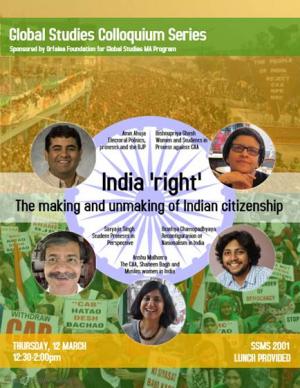The Department of Global Studies' Colloquium Series is a lecture and lunch series, which has been made possible by the generosity of the Orfalea Endowment for the Master's Program in Global Studies. The Colloquium Series strives to open and explore a wide range of interdisciplinary debates and their interaction and engagement with the global, hosting new guest speakers each quarter from UCSB and beyond. The upcoming event has been rescheduled to Thursday, MARCH 12 at 12:30pm and will be hosted in the SSMS 2001 conference room in the Global Studies Department. Please see below for the featured talk:
"India ‘right’: The making and unmaking of Indian citizenship"
Panelists
- Professor Anshu Malhotra, Global Studies—Background; Shaheen Bagh and Muslim women in India
- Professor Utathya Chattopadhyaya, History—The reconfiguration of nationalism in India
- Professor Bishnupriya Ghosh, Global Studies—Women and students in the current protests against CAA
- Professor Satyajit Singh, Global Studies—Student protests in perspective
- Professor Amit Ahuja, Political Science—Electoral politics and what the present protests mean for BJP
The Citizenship (Amendment) Act (CAA) was passed by the Indian Parliament on 11 Dec. 2019. It amends the Citizenship Act of 1955 and creates an easier path for acquiring Indian citizenship for persecuted religious minorities: Hindu, Sikh, Jain, Buddhist, Christian, and Parsi; from Pakistan, Bangladesh and Afghanistan, who entered India before or on 31st Dec. 2014. The Act does not encompass other (non-Islamic) neighboring countries, nor does it consider other persecuted minorities, for example the Rohingya Muslims of Myanmar, the Ahmadiya and Shia of Pakistan, or the Tamils of Sri Lanka. The Act also seeks to relax citizenship by naturalization for the aforementioned categories from 11 to 5 years. While the ruling Bhartiya Janata Party (BJP) was able to pass the Citizenship Amendment Bill (CAB) through the Parliament without a hitch, it was unprepared for the massive protests against the Act that soon followed in a number of places in India. The protests were spearheaded by students from across universities in India. They were joined by ordinary people and protests are still raging in India. The protests have been peaceful in a number of places; but there has also been violence, not least from the police, particularly in states ruled by BJP.
The protests have many dimensions. In North Eastern states like Assam the protests are against the enabling of any immigrants, including Hindu, to acquire Indian citizenship; as they are sensitive to the erosion of Assamese culture through immigration post the 1971 date set by the Assam Accord (1985) to absorb immigrants. In other parts the Act is seen to advance the rightwing government’s ‘Hindutva’ agenda of Hinduizing India. It is specifically seen to violate Article 14 of the Indian Constitution that grants equality to all Indian citizens irrespective of religion, caste and gender. The exclusion of only Muslims from the CAA is seen to be discriminatory and a step towards making Muslims second-class citizens, particularly because the Home Minister Amit Shah announced in both the Houses of the Parliament, that the National Register of Citizens (NRC) would soon be implemented across India. The NRC is meant to identify illegal immigrants/infiltrators (mostly said to be Bangladeshi Muslims) deny them Indian citizenship, and possibly remove them from India (or send them to detention camps); though the Indian Prime Minister post the eruption of protests has denied any talk by his government of the NRC process. However, the Cabinet clearing for the initiation of the National Population Register (NPR) that records all Indian residents is seen as linked to the NRC.
In the light of the BJP government’s attempt at making momentous changes in the functioning of the Indian polity and state (e.g. making Article 370 of the Indian Constitution that gave the Muslim majority state of Jammu and Kashmir special powers inoperative) based upon its overwhelming majority in the Indian Parliament; and its encountering of resistance from the Indian citizenry for the first time in its five and half years’ rule, this panel will discuss what these changes mean to India and its citizens. The situation in India remains fluid and dynamic. The panel will be constituted from among faculty and students of UCSB.
For more information about the Colloquium Series, please contact Professor Jan Nederveen Pieterse, Global Studies Colloquium Director:
jnp@global.ucsb.edu



